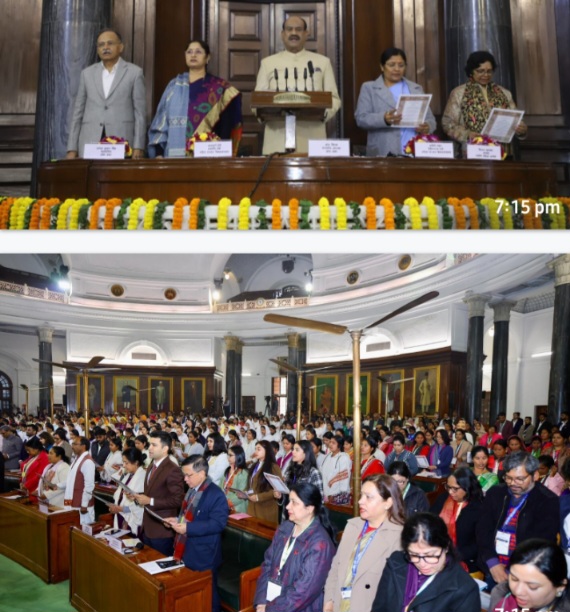Last Updated on January 6, 2025 11:42 pm by INDIAN AWAAZ
Staff Reporter / New Delhi
Lok Sabha Speaker Om Birla today underscored the transformative role of women leadership in strengthening Indian democracy. He said that the inclusion and empowerment of women, especially from rural and tribal communities, are pivotal for the socio-economic change. Highlighting the government’s commitment to fostering gender equality, Shri Birla cited the Nari Shakti Vandan Act as a testament to India’s progressive vision for women’s leadership.
Shri Birla was speaking at the ‘Panchayat Se Parliament 2.0’ programme in the historic Central Hall of Samvidhan Sadan, organized by the Parliamentary Research and Training Institute for Democracies (PRIDE) of Lok Sabha Secretariat in collaboration with National Commission for Women and Ministry of Tribal Affairs.
Union Minister for Tribal Affairs Shri Jual Oram; Union Minister for Women and Child Development, Smt. Annapurna Devi; Minister of State for Women and Child Development, Smt. Savitri Thakur; Members of Parliament; Secretary General, Lok Sabha, Shri Utpal Kumar Singh and Chairperson, National Commission for Women, Smt. Vijaya Rahatkar were among the dignitaries present on the occasion.
The event, which saw the participation of more than 500 tribal women representatives from Panchayati Raj Institutions (PRI) from 22 states and Union Territories, served as a platform to reaffirm India’s commitment to women led development and grassroots empowerment. Acknowledging the invaluable contributions of women in India’s democratic and developmental journey, Shri Birla paid heartfelt tributes to the 15 women members of the Constituent Assembly whose contributions continue to inspire the movement for women’s empowerment in India.
Reflecting on India’s journey over 75 years of independence, the Speaker called on PRI representatives to draw inspiration from the sacrifices of icons like Rani Laxmi Bai of Jhansi and tribal leader Bhagwan Birsa Munda, who epitomize resilience and equality. He highlighted that Bhagwan Birsa Munda’s struggle went beyond the preservation of forests and land, as he also fought to protect the dignity and self-respect of tribal communities. He urged the participants to draw inspiration from Bhagwan Birsa Munda’s life and legacy.
Observing that India, as the Mother of Democracy, has a legacy of women’s participation in governance that continues to inspire the world, Shri Birla noted that from the grassroots level in Panchayats to the national arena in Parliament, the leadership of women has been instrumental in driving change, ensuring accountability, and creating inclusive development models. He lauded the growing presence of women in Panchayati Raj institutions, with several states surpassing the mandated 33% reservation for women, reaching over 50% in some cases. These measures, he stressed, are not symbolic but significant steps toward sustainable and inclusive governance.
Shri Birla urged for making 2025 a landmark year for women’s empowerment, emphasizing the need for women to lead rather than merely participate. He called for making this year, a year of new resolutions, with women becoming self-reliant and driving a socially equitable, economically strong nation and turning their dreams into the country’s destiny. Shri urged the women representatives to compete among themselves to ensure women-led development and rural self reliance. He also urged them to adopt Artificial Intelligence (AI), machine learning and innovation to make their consitutencies more people oriented. On the occasion, Shri Birla intreracted with them through Sansad Bhashini-an AI tool used for translating speeches into 6 Indian languages-Gujarati, Marathi, Odia, Tamil, Telugu and Malayalam.
Emphasizing the importance of leveraging women’s leadership in addressing pressing rural issues such as clean drinking water, sanitation, and education, Shri Birla praised the entrepreneurial spirit of tribal women, who have been creating self-reliant villages through initiatives in traditional crafts, online businesses, and local production. He urged for further support to ensure that these women-led enterprises reach global markets, contributing to economic growth while preserving India’s cultural heritage.
Shri Birla highlighted the positive impact of women leading the representative institutions at the Panchayat level, citing better and more sensitive leadership that effectively addresses community concerns. He said that women’s personal experiences with societal difficulties enable them to develop more robust solutions to local challenges. This, he attributed to their innate problem-solving skills, which facilitate a deeper understanding of issues and the formulation of strategic approaches. Shri Birla emphasized the crucial role of women’s participation in the democratic system, stressing that their increased involvement will yield greater socio-economic transformation in people’s lives.
Union Minister for Women and Child Development, Smt. Annapurna Devi; Secretary General, Lok Sabha, Shri Utpal Kumar Singh; and Chairperson, National Commission for Women, Smt. Vijaya Rahatkar also addressed the delegates. Shri Gaurav Goyal, Joint Secretary, Lok Sabha Secretariat proposed the Vote of Thanks.
During the day, interactive workshops and sessions were organized for the participants who were moderated by experts and Members of Parliament. These focused on areas such as: (i) Constitutional Provisions related to Women with special emphasis on 73rd Amendment the PESA Act; (ii) Schemes and Programmes of Central Government to address Tribal issues.

